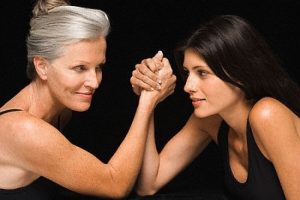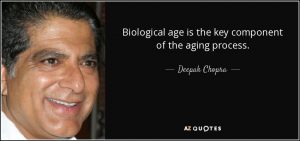Guys we look at the calendar to look at our chronological age, which often boggles us down….. The calendar tells you what your chronological age is, but this number may be far from truthful in defining your real age. Psychologists who study aging, have long ago dispensed with the value of chronological age as a variable to use in research. Chronological age is certainly not an “independent” variable. You see a 70 years old more youthful and healthy than a 35 years old…..we see so many people lying their age, for many reasons. Most of them say they had to lie their date of birth for getting admission in school.
The question, “how old are you? now has a newfound meaning. The Dun edin Multidisciplinary Health and Development Study, more popular as The Dunedin Study conducted by the University of Otago, New Zealand, brought more light to the perception of age: every human being has a chronological age and a biological age. The pioneering study set in motion several follow-up researches.
edin Multidisciplinary Health and Development Study, more popular as The Dunedin Study conducted by the University of Otago, New Zealand, brought more light to the perception of age: every human being has a chronological age and a biological age. The pioneering study set in motion several follow-up researches.
According to a research from the University of Chicago, chronological age doesn’t play a role when accounting for differences in health and wellness of older individuals. The study used a sample of 3,000 people between the ages of 57 and 85 to gather data over a five-year time period.
Traditional biomedical markers were used: health conditions, such as heart disease, cancer, high blood pressure and elevated cholesterol levels. The study from the University of Chicago used other markers, such as psychological well-being, mobility, eyesight, history of bone fractures, and 50 other health variables.
Until recently, most medical professionals ranked our health and longevity based on our health conditions, such as diabetes, osteoporosis or cancer. However, it is also clear that everyone responds to these illnesses and treatments differently, based on his/her overall health, genetics and lifestyle choices.
Chronological age is the actual amount of time a person has been alive. We are used to calculate age of a person in years, months, and days from the date the person was born. The number of years a person has lived, especially when used as a standard against which we measure behaviour, intelligence etc. Chronological age does not necessarily contribute to the ageing symptoms that we often see. It is not a determinant of health. For example, due to our regular use of knee joints, it would theoretically mean that after crossing a certain age, we are susceptible to arthritis due to wear and tear. But, that is not the case for everyone. We often see young people suffering from joint pain while a 70-year-old goes on a steep trek, or participates in marathon each year.
Biological age is calculated by taking into consideration various factors such as lifestyle, genetics, exercise, sleep habits, liveliness of the person, physical and mental health factor so on, https://medfitnetwork.org/public/valium-diazepam-oral/. A question many psychiatrists and physicians are considering is that we should take our biological age more seriously than our chronological age. Many of these say that biological age is an authentic measure of our age than our date of birth. The biological age is calculated by measuring the largest (scientifically researched) influences on longevity. The fact is while we cannot reduce the ageing process entirely, we can certainly help in slowing it down. According to experts, healthy ageing, or longevity, is dependent not only on the number of years lived, but on the quality of life. For example, living for 90 years will not be considered healthy ageing if that person needs life-support or has had a very weak immune system throughout his or her life.
Body age is a measurement of how old you are biologically based upon your health and fitness level as opposed to what your birth certificate indicates. For example, someone who is thirty-five years old may have a body age that is ten years older.
Psychological age is how old one feels, acts, and behaves. It is not at all related to chronological age. Some people act older than they really are and some act vice versa. It all depends on how fun loving and lively a person is. It is subjective description of one’s experience using non-physical features. We see older people getting along well with younger people, being friends with them. Psychological age is trying to tell age of somebody without markers, but by behaviour.
Functional age is defined as a combination of chronological, biological, and psychological ages, instead of focusing on one aspect at a time. It gives more holistic picture of a person. It also gives the clearest understanding of a person. It gives a glimpse about a person’s emotional and logical maturity also.
Social age encompasses both societal and technological changes succeeding the Information Age. It is different from the Information Age as it gives more prominence to social factors when adopting and/or extending technology and information. It broadens the definition of Attention Age because the Social Age focuses on many forms of societal interactions including online relationships, collaboration and sharing. I am writing here about social age because when a person is tech-savvy, he/she remain mentally more agile.
Cognitive age is concerned with the basic processes of learning and memorising as well as with the complex higher-order processes of language and intellectual competence or executive functioning.
So friends, I think it is stupid to worry about your age. Let others keep calculating your chronological, biological, cognitive, social age if it is their business. Don’t get hassled too much about your age. What you can do is, certainly try to take good care of yourself and living a healthy lifestyle. Age is a state of mind and you are only as old as you feel. Avoid stress, exercise in any form – dancing, bicycling, swimming, running, skipping or walking. Exercising contributes to stress reduction besides it helps build stamina. Drink plenty of water – it not only flushes out the toxins from our body, but also helps keep skin supple. This slows the onset of fine lines and wrinkles. Sleep well, do not compromise on sleep and don’t be too concerned with others.














































